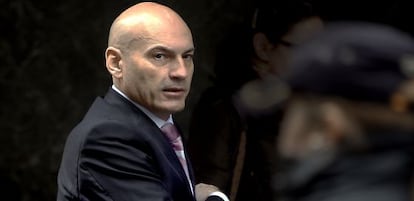“We could have put away ETA members for life with just a fraction of the evidence”
The judge in charge of the 11-M trial says that no one still believes the conspiracy theories


Judge Javier Gómez Bermúdez presided over the trial of the men accused of carrying out the March 11, 2004 bomb attacks on Atocha railway station in Madrid. His verdict established that the armed Basque separatist group ETA was not responsible, nor in any way was it linked. As a result, the ruling was vilified by conspiracy theorists in the media and on the political right.
Q. Why do you think, a decade on, that Spanish society continues to be divided over an attack that killed 192 people and left 1,857 others injured?
A. The proximity of the elections blighted everything. The losers blamed the attacks, and the winners denied that it helped them. And that divides society. An attack of this nature provokes very different psychological responses. The first is to think that such a terrible attack cannot be done without assistance from on high, when actually it is very easy. Then people begin to think that there is a cover-up. All attacks of this nature are the result of security lapses, and this was definitely a major lapse.
Q. Is there now a lower risk of such an attack taking place again?
All attacks of this nature are the result of security lapses, and this was definitely a major lapse"
A. We are much better prepared, and the proof is that there hasn’t been a jihadist attack in 10 years. The most important thing is having learned to get over this. Spanish society has shown tremendous strength; without doubt the hardest test of its resilience since the Civil War.
Q. There are still a few lone voices out there insisting that ETA was behind the attacks.
A. Nobody believes in the ETA theory any longer, not even those who originally insisted on it. That said, some people believe that the full story is yet to be told. But this is always the case, even with the assassination of Kennedy. This is based on a false belief that the justice system can get to the bottom of everything. Does this mean that we do not intend to continue investigating? No. As long as any of the men responsible for the attacks are still free, or we have not been able to establish that they are dead, we will continue investigating. Four years ago, we finally sentenced a man who had murdered two people in 1981. We will never stop investigating.
Q. Why do you think, then, that some sectors of the media continue to peddle this idea?
Many people in senior positions in our society behaved less than charitably"
A. Initially, the reasons for insisting on the ETA angle were honest, but they were later twisted for whatever reasons. Anybody looking at this objectively can see that a tremendous amount of effort has been put into this investigation and that there are very few doubts left about who was responsible.
Q. What was the personal cost to you of the attacks in the media and from the Popular Party?
A. Well, there is the fact that the attacks were very tough, and then there is the fact that I didn’t care about them. But those around me were hurt by the attacks: my wife, my daughters, my family in general, and that was disgraceful.
Q. Would things have been easier if ETA had been responsible?
A. It’s not about the trial itself, but the process that led to the trial. I think the problem is the way that events are manipulated. Many people in senior positions in our society behaved less than charitably and could have prevented a lot of things that were done and said. There were more than 2,200 families directly involved in the bombings, and they were used, which is shameful.
Q. Can you put a name to some of those responsible?
A. We all know who they are… What happened was a deliberate attempt to divide Spanish society, to take us back to the days of the dictatorship.
Q. A decade on, have we healed those wounds?
A. To a large extent, yes. Most of us were not really traumatized by what happened, but the victims probably still are. And there are people like Pilar Manjón [head of the March 11 victims’ association] who have been despicably treated and insulted, and I think that is disgusting, on a human, political, and personal level.
Q. How long did you spend dismantling the conspiracy theories put forward by the right-wing media?
A. By the time we got to trial, these theories had all been dismissed as fantasy, but they slowed down the preparations for trial, and the judges did an incredible job sifting through each accusation, and then dismissing it. Then there is the way some in the media deliberately twisted the story to fit their own theories, effectively misinforming their audience.
Q. Prime Minister Mariano Rajoy, then leader of the opposition, questioned the authenticity of one of the rucksacks used in the attacks. Do you have any doubts about the evidence presented by the prosecutors’ office?
A. I think that after the trial, Rajoy had no doubts. For example, if we had applied the same burden of proof in a trial of ETA suspects, they would all probably walk free. With just a twentieth of the evidence we collected in the March 11 trial we could have put every single member of ETA away for life.
Q. Do you think the March 11 trial had anything to do with you not being re-elected head of the Criminal Division of the High Court?
A. The trial was an effect, not a cause. The cause is not the trial or the sentence, but what I said about what happened, which makes me a difficult person to handle. And power doesn’t like people who are difficult to handle.
Q. Are there judges who are easy to handle?
A. Of course.
Q. And is this the case with most judges?
A. I think that most of us are difficult to control, but those of us who are close to affairs of state are the ones who suffer the consequences.
Tu suscripción se está usando en otro dispositivo
¿Quieres añadir otro usuario a tu suscripción?
Si continúas leyendo en este dispositivo, no se podrá leer en el otro.
FlechaTu suscripción se está usando en otro dispositivo y solo puedes acceder a EL PAÍS desde un dispositivo a la vez.
Si quieres compartir tu cuenta, cambia tu suscripción a la modalidad Premium, así podrás añadir otro usuario. Cada uno accederá con su propia cuenta de email, lo que os permitirá personalizar vuestra experiencia en EL PAÍS.
¿Tienes una suscripción de empresa? Accede aquí para contratar más cuentas.
En el caso de no saber quién está usando tu cuenta, te recomendamos cambiar tu contraseña aquí.
Si decides continuar compartiendo tu cuenta, este mensaje se mostrará en tu dispositivo y en el de la otra persona que está usando tu cuenta de forma indefinida, afectando a tu experiencia de lectura. Puedes consultar aquí los términos y condiciones de la suscripción digital.








































